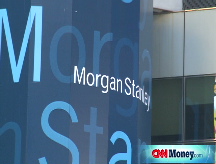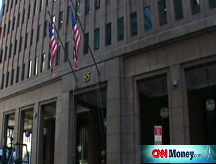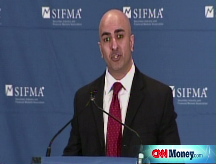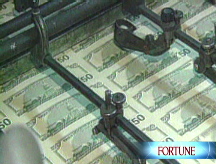Wall Street cheers rate cut
Stocks surge after the central bank cuts a key interest rate to the lowest level on record.
NEW YORK (CNNMoney.com) -- Stocks surged Tuesday after the Federal Reserve cut a key short-term interest rate to the lowest level on record, and signaled it had more tools available to help the economy as the recession stretches on.
Treasury prices rallied, lowering the corresponding yields, as investors pulled money out of the safe-haven commodity and put it into stocks.
The Dow Jones industrial average (INDU) added 360 points, or 4.2%. The Standard & Poor's 500 (SPX) index rose 5.1% and the Nasdaq composite (COMP) gained 5.4%.
The central bank opted to lower the federal funds rate to a targeted range of between zero and 0.25%. That's the lowest level on record, going back to 1954. The rate stood at 1% previously. Economists thought the Fed would lower the rate to 0.5% or possibly 0.25%.
Stocks had been up modestly ahead of the 2:15 p.m. ET announcement, but surged right afterward.
"I think the Fed was virtually out of ammunition on the target side, so even this little move of setting a range was better than what people were expecting," said Jack Ablin, chief investment officer at Harris Private Bank.
Ablin said that stocks were rallying after the announcement on both the surprise element and the realization that the Fed is willing to do whatever it takes to battle deflation and get the economy "off the mat."
In its closely watched statement, the bank said the economic outlook has worsened amid a deteriorating labor market and weaker consumer spending and business investment. The bank also said inflationary pressures have waned.
"I think they are acknowledging that their attempt to restart economic growth has only been partly effective and that at its current point, the recession is deeper than what they had anticipated," said Gregory Miller, chief economist at SunTrust Banks.
The Federal Reserve has cut rates since September 2007 in an attempt to staunch the economic slowdown. But the economy has actually worsened. The United States has been in a recession since December 2007 and is expected to remain in one through next year.
The Fed has also taken a number of unusual steps this year in its efforts to thaw the credit freeze and get banks to start lending to each other and consumers again.
But the lowering of rates and the flooding of the market with money hasn't helped with the "transmission of liquidity," Miller said, as banks have been unwilling to loan out most of what they've received.
Seeming to acknowledge this in the statement Tuesday, the bankers discussed the possibility of buying up longer-term Treasury securities, a move that could ultimately help lower mortgages.
"If this policy manages to lower the costs on new mortgages, maybe then we can staunch the bleeding in the housing market," Miller said.
Homebuilders, financial services firms, REITs and consumer issues such as retailers all led the stock advance.
Market breadth was positive. On the New York Stock Exchange, winners topped losers by five to one on volume of 1.54 billion shares. On the Nasdaq, advancers beat decliners by three to one on volume of 2.25 billion shares.
Company news: Goldman Sachs (GS, Fortune 500) reported its first quarterly loss since going public in 1999. The investment bank said it lost $2.1 billion, or $4.97 a share, versus a profit of $3.2 billion, or $7.01 a share, a year ago. Results were worse than expected. Despite the report, shares gained 14%.
Other big financial shares gained as well, including Bank of America (BAC, Fortune 500), Citigroup (C, Fortune 500), and JP Morgan Chase (JPM, Fortune 500).
Best Buy (BBY, Fortune 500) reported weaker earnings versus a year ago that nonetheless beat forecasts and stronger sales versus a year ago that also topped expectations. The retailer said it may have to announce more layoffs and slow its new U.S. store openings. Shares gained almost 18%.
Automakers: In other news, the government could announce a plan to help the troubled automakers as soon as Wednesday. The Bush administration said last week that it would consider offering General Motors (GM, Fortune 500) and Chrysler bridge loans from the $700 billion bailout fund Congress set aside for Wall Street.
Both GM and Chrysler have said they need financing ASAP. Ford Motor (F, Fortune 500) has stated it has enough money to function, but that it would like to have the option of government funds should conditions deteriorate.
GM shares gained 4% Tuesday, while Ford shares fell 1.5%.
Stocks fell Monday on fears about the fate of the struggling automakers and questions about the Bernard Madoff scandal. Money manager Madoff was arrested last week on charges that he ran a $50 billion pyramid scheme that duped companies around the globe.
Economic news: Housing starts and building permits fell to record lows in November, the latest sign that the market has not yet reached bottom. Housing starts plunged more than 19% to an annual rate of 625,000 in November, the Commerce Department reported, while building permits slipped to an annual rate of 616,000. Both results were worse than what economists surveyed by Briefing.com had expected.
Another report showed weaker consumer inflation than had been expected. The Consumer Price Index (CPI) fell 1.7% in November, after sliding 1% in the previous month. Economists thought CPI would fall 1.3%.
The so-called core CPI, which strips out volatile food and energy prices, was flat versus forecasts for it to rise 0.1%. Core CPI dropped 0.1% in the previous month.
Bonds: Treasury prices rose, lowering the yield on the benchmark 10-year note to 2.28% from 2.50% Monday. Treasury prices and yields move in opposite direction. The 10-year yield dipped below 3% in November for the first time since the note was first issued in 1962.
Lending rates improved. The 3-month Libor rate slipped to 1.85% from 1.87% Monday, according to Bloomberg. The overnight Libor rate edged up to 0.16% from a record low of 0.12%. Libor is a key bank lending rate.
Other markets: In global trading, Asian markets were mixed, while European markets mostly ended higher.
The dollar fell to an 8-week low versus the euro and hovered near a 13-year low against the yen.
U.S. light crude oil for January delivery fell 91 cents to settle at $43.60 a barrel after rallying in the morning on bets that OPEC will cut output during its meeting in Algeria on Wednesday.
COMEX gold for February delivery gained $6.20 to $842.70 an ounce.
Gasoline prices rose one-tenth of a cent to a national average of $1.661 a gallon, according to a survey of credit-card swipes released Tuesday by motorist group AAA. It was only the third increase in the last 90 days. ![]()





